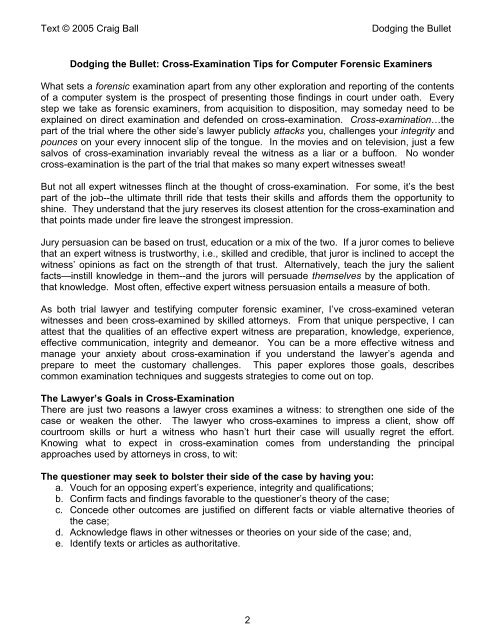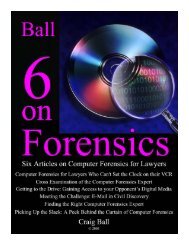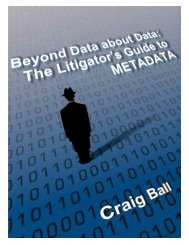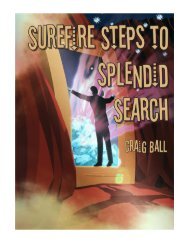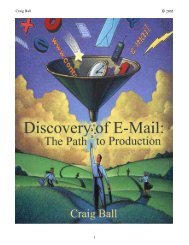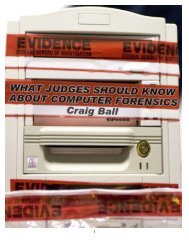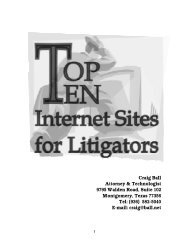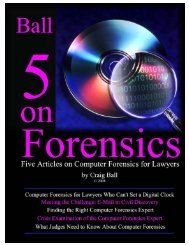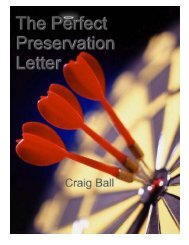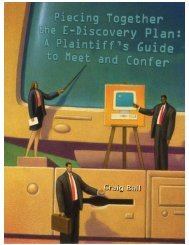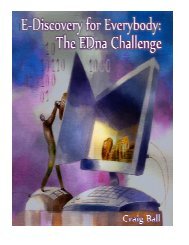The Ten Commandments of Cross-Examination for ... - Craig Ball
The Ten Commandments of Cross-Examination for ... - Craig Ball
The Ten Commandments of Cross-Examination for ... - Craig Ball
You also want an ePaper? Increase the reach of your titles
YUMPU automatically turns print PDFs into web optimized ePapers that Google loves.
Text © 2005 <strong>Craig</strong> <strong>Ball</strong> Dodging the Bullet<br />
Dodging the Bullet: <strong>Cross</strong>-<strong>Examination</strong> Tips <strong>for</strong> Computer Forensic Examiners<br />
What sets a <strong>for</strong>ensic examination apart from any other exploration and reporting <strong>of</strong> the contents<br />
<strong>of</strong> a computer system is the prospect <strong>of</strong> presenting those findings in court under oath. Every<br />
step we take as <strong>for</strong>ensic examiners, from acquisition to disposition, may someday need to be<br />
explained on direct examination and defended on cross-examination. <strong>Cross</strong>-examination…the<br />
part <strong>of</strong> the trial where the other side’s lawyer publicly attacks you, challenges your integrity and<br />
pounces on your every innocent slip <strong>of</strong> the tongue. In the movies and on television, just a few<br />
salvos <strong>of</strong> cross-examination invariably reveal the witness as a liar or a buffoon. No wonder<br />
cross-examination is the part <strong>of</strong> the trial that makes so many expert witnesses sweat!<br />
But not all expert witnesses flinch at the thought <strong>of</strong> cross-examination. For some, it’s the best<br />
part <strong>of</strong> the job--the ultimate thrill ride that tests their skills and af<strong>for</strong>ds them the opportunity to<br />
shine. <strong>The</strong>y understand that the jury reserves its closest attention <strong>for</strong> the cross-examination and<br />
that points made under fire leave the strongest impression.<br />
Jury persuasion can be based on trust, education or a mix <strong>of</strong> the two. If a juror comes to believe<br />
that an expert witness is trustworthy, i.e., skilled and credible, that juror is inclined to accept the<br />
witness’ opinions as fact on the strength <strong>of</strong> that trust. Alternatively, teach the jury the salient<br />
facts—instill knowledge in them--and the jurors will persuade themselves by the application <strong>of</strong><br />
that knowledge. Most <strong>of</strong>ten, effective expert witness persuasion entails a measure <strong>of</strong> both.<br />
As both trial lawyer and testifying computer <strong>for</strong>ensic examiner, I’ve cross-examined veteran<br />
witnesses and been cross-examined by skilled attorneys. From that unique perspective, I can<br />
attest that the qualities <strong>of</strong> an effective expert witness are preparation, knowledge, experience,<br />
effective communication, integrity and demeanor. You can be a more effective witness and<br />
manage your anxiety about cross-examination if you understand the lawyer’s agenda and<br />
prepare to meet the customary challenges. This paper explores those goals, describes<br />
common examination techniques and suggests strategies to come out on top.<br />
<strong>The</strong> Lawyer’s Goals in <strong>Cross</strong>-<strong>Examination</strong><br />
<strong>The</strong>re are just two reasons a lawyer cross examines a witness: to strengthen one side <strong>of</strong> the<br />
case or weaken the other. <strong>The</strong> lawyer who cross-examines to impress a client, show <strong>of</strong>f<br />
courtroom skills or hurt a witness who hasn’t hurt their case will usually regret the ef<strong>for</strong>t.<br />
Knowing what to expect in cross-examination comes from understanding the principal<br />
approaches used by attorneys in cross, to wit:<br />
<strong>The</strong> questioner may seek to bolster their side <strong>of</strong> the case by having you:<br />
a. Vouch <strong>for</strong> an opposing expert’s experience, integrity and qualifications;<br />
b. Confirm facts and findings favorable to the questioner’s theory <strong>of</strong> the case;<br />
c. Concede other outcomes are justified on different facts or viable alternative theories <strong>of</strong><br />
the case;<br />
d. Acknowledge flaws in other witnesses or theories on your side <strong>of</strong> the case; and,<br />
e. Identify texts or articles as authoritative.<br />
2


